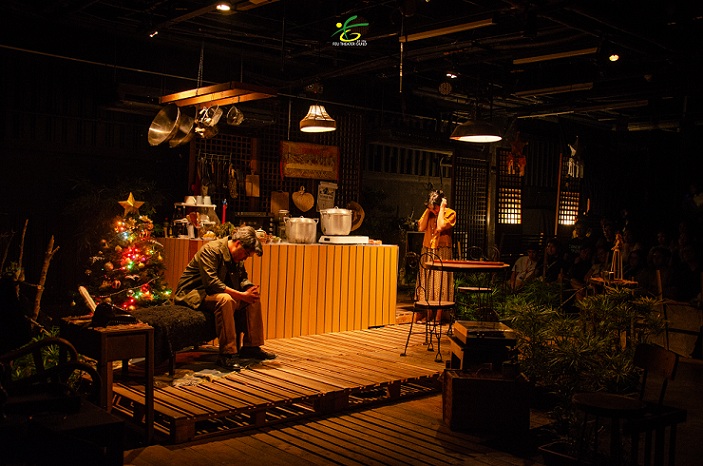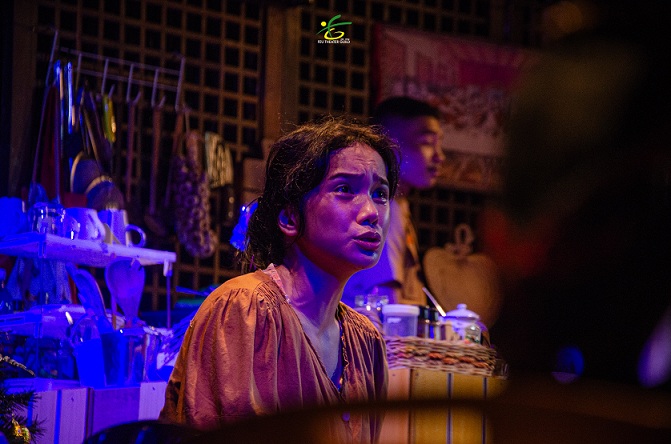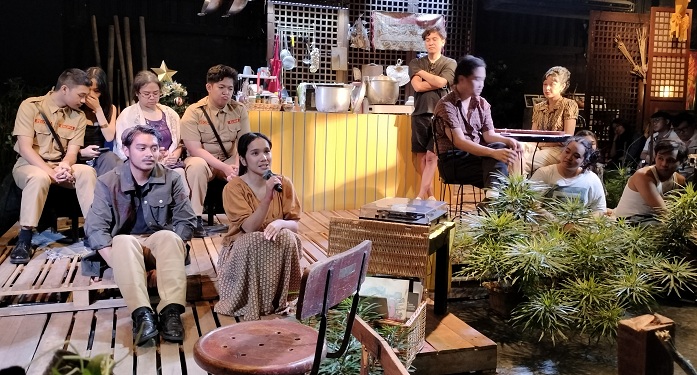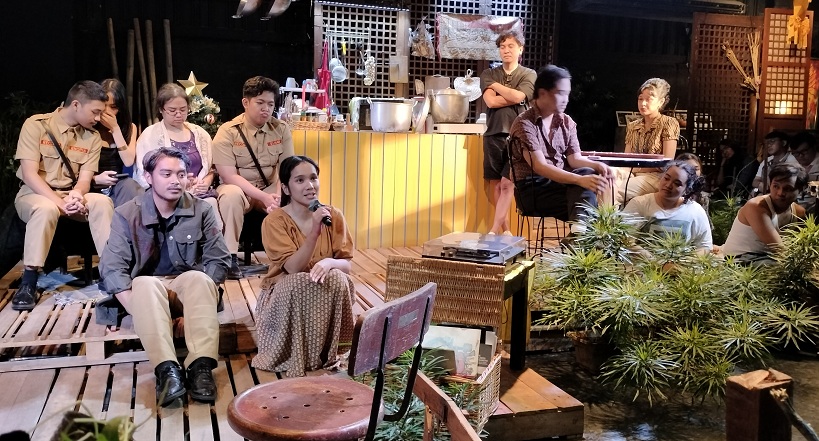
The audience’s proximity to the stage departs from the usual theater setup. One extends an arm or stretches a leg and one is at hair’s breadth of the cast of “Karne,” a play by the FEU Theater Guild (FTG). The actor chops and sautés garlic on stage as the audience enters, making one wonder if the play has started. The smell of garlic and the sizzle of the oil fill the tiny, dimly lit FEU Center for the Arts Studio, where, with the audience settled down, the aesthetic vicariousness transforms into a profound viewing experience.
“Karne,” FTG’s 91st season opener, is written and directed by Dudz Teraña, who reinterpreted Roald Dahl’s “Lamb to the Slaughter,” a short story that combines horror with dark comedy.
Filipino connection
The play is par for the course as FTG’s season opener. A strong advocate of theater as a space for truth, provocation, and community, the 91-year-old student theater organization presents socially relevant productions and tells Filipino stories while developing new talent.
At the talkback session after the Aug. 23 press preview, Tereña said FTG selected Dahl’s story because it suited the guild’s theme of short stories for the year. He said he had reworked it to present Philippine society in the 1980s when political correctness didn’t exist and women were hardly visible.
“[‘Karne’] explores relationships — husband and wife, friends and neighbors, and how women start to stand up for themselves. We [Filipinos] don’t have the concept of ‘bakod’ (fence) and how its [absence] affects relationships,” explained Tereña, who is FTG artistic director and the Philippine Educational Theater Association’s senior artist-teacher.
An interesting aspect in Tereña’s reimagining of Dahl’s piece is the use of Bisaya, alongside English and Filipino, in the dialogues. Being, he said, not a speaker of Bisaya, he found it challenging to take on but went ahead nonetheless, spurred by his fascination with the rhythm of the language.
And here lies the frustrating hitch for a viewer fluent only in Filipino and English: One misses out on the nuances of Bisaya. But then it’s what pushes Bisaya-handicapped viewers to concentrate on understanding how the story of the Partosas unfolds, as initially told by their friends, neighbors, and other barangay folks.

Gender roles
Dahl’s Patrick and Mary Maloney, residents of England in the 1950s, become Patrick and Mary Partosa of Barangay Lubuton in Zamboanguita in the 1980s in “Karne.” Both Patricks are with the police force — Maloney a detective and Partosa a town police chief — while the two Marys are devoted housewives.
Tereña diverges from Dahl’s story by exploring patriarchy, the oppression of women, and martial law. Initially, Patrick (played by RB Pascua, with alternates Aaron Bayani and Arvin Javier) seems sweet and flirtatious. He sweeps Mary (played by Julia Nicole Banaag, with Maria Mayano and Janae Dionisio alternating ) her feet when they first meet in Baguio, but eventually marriage reveals him as a reprobate. He brooks no argument on gender roles: He’s the breadwinner, the decision-maker, and the law, as conventional marriages go within patriarchy. His wife, of the “inferior sex,” merely hovers in the background.
Mary is the tormented wife whose suppressed feelings bubble to the surface and explode. She once had a career and a life but falls into a dreary routine of housekeeping and cooking beef adobo, Patrick’s favorite dish. Her self-sufficiency — she has lately been selling ice to neighbors on the side —angers Patrick, and he beats her. To him, it is like she’s chiding him as a failed provider.
In contrast, Ellen, one of Mary’s bosom friends, embodies what a woman should be: confident, strong, candid, well-dressed. Ellen (Maria Ysabel de Los Reyes, with Dianne Andallo alternating) despises Patrick and is unafraid to stand toe-to-toe with him. Another friend, Maloi (Bjorn Pestaño, with Margarita Barrameda alternating) is the group’s Pollyanna. She thinks Mary’s marriage is going well despite the apparent instability.
Dante (Jharelle Villalobos, with Jonas Cunanan and Rena Dotillo alternating) completes the clique. He balances the play’s gravitas with hilarious remarks. His homosexuality amplifies the ambiguity of his place in society while simultaneously defying society’s compulsory heterosexuality. The fluidity of his “essence” renders him free to move (he sashays like a beauty queen) and speak (in a pointed and risqué manner).
Enter the toxic masculinity of Patrick and his men. Patrick is the most violent of them: He insults and hits his wife, slaps and points a gun at a subordinate. And his men parrot his ways, from the swagger, the gruff voice, to the threatening glare.
Tropes
The title foreshadows the play’s seriousness. Symbolically, karne, the Filipino word for meat, is connected with masculinity, physical strength, and power — traits attendant to patriarchy and personified by Patrick. Metaphorically, Patrick is the “meat of the matter,” an intrinsic part of a patriarchal society under martial law, wielding tremendous power as a state agent of law and order. Martial law is the play’s “meat-on-the-bones.”
But formidable as Patrick is, he’s a meathead drunk with power and falsely believing he’s a cut above the rest. His men are likewise meatheads pandering to a chief who treats them like dirt Credo (Kristan Orbegoso) is particularly subjected to indignities by Patrick.
Beef adobo is an innovative metaphor. Tereña uses beef — not the usual pork — for the beloved dish because the cow, more than the pig, symbolizes innocence, nonviolence, and selflessness. Mary has imbibed this and is stewing in submissiveness and suppressed emotions. Paralleling the dish is the cooking process of adobo, the patient simmering of the meat in vinegar and soy sauce, somehow reflecting the vaunted resiliency of Filipinos. But Tereña shatters the clichéd resiliency with Mary boiling over when Patrick declares that he is leaving her.
Bridges
That Dahl’s story and the tropes are much older than the play’s actors invites skepticism of their acting ability and understanding of the material. To bridge the gap, Tereña said that after putting the play together in three days, he immersed his young cast in discussions and study-scene work on such subjects as women and martial law for two months. He also gave them ample quiet time for emotional preparation.
For De Los Reyes (Ellen), the “deep studies of the characters” made it easier for her and Villalobos (Dante) to lend authenticity to the play. The studies were paired with following Tereña’s counsel: Serve for the truth, the play and script, and respect the director.
Pascua (Patrick) said he turned to his father, a policeman, “for inspiration.” He also studied martial law to portray his character’s arrogance and narcissism. Orbegoso looked to people who experienced martial law, like his grandparents, and read up on the desaparecidos (the disappeared) to bring Credo to life. Banaag said she put herself in the shoes of women who tirelessly exercised self-censorship to channel Mary — a process she discovered was enervating — and found relief particularly when her character let loose, although it was exhausting mentally and physically. (To decompress, Banaag said, she sits in silence and reflects on what she did on stage.)

Realities
A drama in the Aristotelian sense is mostly cathartic, but not “Karne.” There’s no distancing one’s self from the tragedy, and it’s difficult to merely enjoy the play for its aesthetic pleasure. One doesn’t leave the theater emotionally renewed. The topic and the cast’s compelling performances push viewers to seethe at Patrick’s violence and commiserate with Mary (and occasionally get annoyed by her meekness).
The saying that “every moment is a teaching moment” is evident in “Karne.” It lays down the troubling realities of Philippine society. It addresses patriarchy’s erasure of women. Before becoming a wilting housewife, Mary was vivacious and enjoying a promising career. The other issue is martial law, which is being expunged through historical revisionism. This dark, significant part of Philippine history needs to be shared with the young and clueless.
“Karne” gets under one’s skin, leading one to wonder why Filipinos perpetually “simmer” in crises. Resilience is laudable until it isn’t.
“Karne” runs at the FEU Center for the Arts Studio on Sept. 11–13, 18–20, 25–27; Oct. 2–4, 9–11, 16–18, 23–25, 30; and Nov. 6–8. The show starts at 6:30 p.m. Ticket prices are ₱200, ₱500 and ₱700. Connect with FTG on Facebook: Far Eastern University Theater Guild, Instagram and TikTok: @feutheaterguildofficial, and Twitter/X: @ftg1934.

